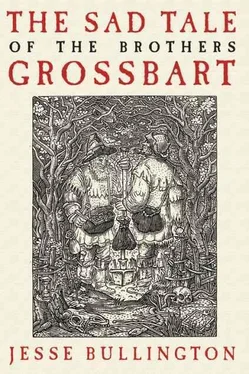“I know what you are plotting.” The priest addressed the village as much as he did Heinrich. “You wish justice! Don’t we all? But you risk your soul by attempting to do the Lord’s work for Him!”
“And you don’t try and do the Lord’s work every day?” said Heinrich, earning gasps from more than one neighbor. “I aim to do one thing, and that’s catch the Grossbarts before they can get to a priest and wash themselves clean. There’s no place in Heaven for such as them, and I’m but an instrument of God.”
“You?! Heinrich, you are incensed with grief and rage and pride, and it is a terrible sin to call yourself such! Let the Lord work His own justice and risk not your soul!”
“I’ll need your help.” Heinrich turned from the priest to the blanched faces surrounding him. “I’ve no horse nor blankets nor food nor weapons-they took everything. But I swear I won’t rest until I’ve sent them to their master. Hannah, your Gunter-”
“My Gunter,” spit the snotty-faced widow, “died because of you!”
“Me?” Heinrich felt as though the woman had punched him in the stomach. “No, I-”
“Cried and begged and wailed, wanting your wrongs righted! You’d trusted to the Lord he’d not have gone off with the rest and been murdered by those devils!”
“Hannah,” Heinrich pleaded. “I wanted to go with them! I know their ways more than any here and I could have…” He trailed off seeing the cold eyes of his neighbors, faces set, cheeks puffy. Lowering his head farther, Heinrich nearly choked on the “Please.”
None spoke, several turning back to their homes.
“Better go,” Egon hissed, and Heinrich blinked away the tears, trying to fathom how they were blaming him instead of the wicked Grossbarts. “I understand even if they don’t. I’ll ride you out as far as I can, aye?”
“I’ll buy her,” Heinrich said as they turned away from the silent condemnation of the town. “My whole field’s yours. You know it’s more than fair.”
“I’m sorry, Heinrich.” Egon stopped and stared at the dirt after they rounded his hut to where the nag stood tethered. “You know’s well as any that we’ve got a sight fewer horses than we did a few days ago, so I won’t be the only one needin this girl. But while they was…” Egon paused, cleared his throat, and wiped his eyes at the horrid memory before he was able to finish. “While those Brothers was doing their work I cut Hans and Helmut’s horses loose, so perchance we’ll come across’em on the road.”
Heinrich nodded, understanding too well the man’s reluctance to sell the animal with planting just a winter away.
“And if we don’t come across them horses,” Egon continued, “well, I’ll take you clear down to the highway they’re probably makin for. Gain some ground, as they cut into the mountains on the old hunting trail, try and shortcut it. But I know that little path don’t go nowhere so it’ll add days if not weeks fore they get over to the real road. Assuming they’re going south, of course.”
Neither had anything more to say on the matter, Heinrich still trying to understand how any could fault him for everything that had transpired over the past several days. Heinrich climbed onto the horse behind his last friend and they rode back around the house toward the southern road. Egon’s son intercepted them with a sack of turnips and then they were off, but Heinrich failed to thank him properly. All the man could think of was the impossibility of catching the damned Brothers without a steed of his own.
VI. The Teeth of a Donated Horse
Manfried sweated and shuddered in his nightmares, his mind sensing his impending death and providing appropriate visions. The manticore stalked him through tightening caverns, his brother, his faith, and his weapons all missing. The pearls of the desert would remain buried and only his beard would grow in the grave.
Hegel nearly dropped his sick brother a dozen times that day, sliding on moss and rot as he staggered through the dim forest. Clearly the miasma found in low-lying regions had affected Manfried, Hegel assumed, refusing to allow the possibility of manticore venom. The solution lay in reaching higher ground where the wind prevented the pestilential vapors from gathering.
Both had nearly expired from the plague when they were ten years old and Hegel knew the cure as well as the symptoms-since Manfried had yet to sprout the buboes, clean wind and prayer might save him. Their mother had known, which is surely why she delivered them into a decayed lean-to high in the hills and abandoned them when their humours became disturbed so long ago.
Hegel dragged Stupid’s hardened skin behind them by its former owner’s tether, but with his brother’s dead weight on his shoulders Hegel had to leave most of the meat behind. He wheezed his way up the creek, reckoning it to be the surest path to higher ground. Pausing only when it was necessitated by exhaustion, Hegel trudged onward, his injured right arm dripping more than sweat from his exertions. Midday never came in that dismal wood, evening following directly after morning. The snow fell steadier than before, and his brother’s damp body pressing against his back gave Hegel a stubborn cough.
With the light almost gone and the forest even thicker, Hegel laid his dying brother on the ground and collapsed beside him, hacking up phlegm. He pinched Manfried’s nose and poured water down his throat and unsuccessfully attempted to force him to swallow some horse meat Hegel had chew-softened. He gathered wood but his numb fingers hampered his ability, and he glumly realized the smoke leaving his mouth with each breath would probably exceed what he could coax from the damp branches. Returning to his equally snow-brushed brother, Hegel began to pray.
The pitiful fire he managed hissed and popped, and no matter how hard Hegel blew the thick pieces would not catch and the thickening snow sizzled as it smothered. As he looked up to curse the heavens, his sharp eyes caught a hint of red in the forest. Holding his breath, terrified it was only his own paltry fire reflecting off a wet leaf, he stood and stared. He took several weak-kneed steps forward, squinting. His wide grin split his cheek anew, blood dribbling into his beard.
Hurriedly gathering their scant provisions and hoisting his brother, Hegel plowed through the underbrush, blind but for the white cloud of snow around him and the distant beacon. He broke into a clearing and stumbled onward, free of the limbs and roots that impeded his progress. Now he could make out the roof and walls, and the single window glowing through the white and black night. He had feared it to be fairyfire or worse, but Mary be praised, a cabin emerged from the snow and darkness.
Without setting down his brother he slapped the flimsy door with his good hand, bellowing out:
“Open up! Ill man out here, open up! Open up in the name a Mary and all the saints!”
Nothing. No sound at all, save the Brothers’ labored breathing. Manfried moaned in his sleep, and Hegel banged again.
“Open up or I’ll knock it down,” Hegel roared. “Give us our sanctuary or by Mary’s Will I’ll take it!”
A shuffling came toward the door. A voice, faint enough to be almost drowned out by Manfried’s whimpering, floated through. Hegel could not say if it belonged to man or woman, child or parent.
“Your word first,” flitted out. “You’ll do no evil, lest your soul be blackened for all time.”
Impatient beyond reckoning, Hegel yelled even louder. “Course I ain’t evil! Open up!”
“And you’ll try no mischief, nor do no harm?”
“There’ll be mischief plenty if you don’t let us in!”
“Your word.”
“My word, yes, and my brother’s, and Mary’s, and her moon-fruit boy’s if you open up!”
Читать дальше












